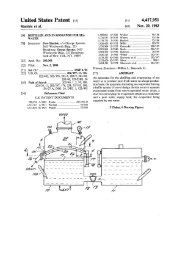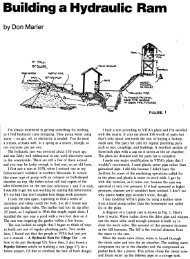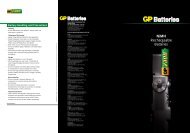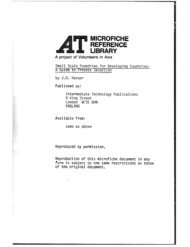- Page 1 and 2:
WIND ENERGY SYSTEMS Electronic Edit
- Page 3 and 4:
ii 4 Wind Turbine Power, Energy, an
- Page 5 and 6:
iv 9.9 Wind farm Costs.............
- Page 7 and 8:
vi and Chapter 8, so we can give a
- Page 9 and 10:
Chapter 1—Introduction 1-1 INTROD
- Page 11 and 12:
Chapter 1—Introduction 1-3 same w
- Page 13 and 14:
Chapter 1—Introduction 1-5 Thomas
- Page 15 and 16:
Chapter 1—Introduction 1-7 Figure
- Page 17 and 18:
Chapter 1—Introduction 1-9 power
- Page 19 and 20:
Chapter 1—Introduction 1-11 servi
- Page 21 and 22:
Chapter 1—Introduction 1-13 incre
- Page 23 and 24:
Chapter 1—Introduction 1-15 Figur
- Page 25 and 26:
Chapter 1—Introduction 1-17 three
- Page 27 and 28:
Chapter 1—Introduction 1-19 Figur
- Page 29 and 30:
Chapter 1—Introduction 1-21 Figur
- Page 31 and 32:
Chapter 1—Introduction 1-23 [9] R
- Page 33 and 34:
Chapter 2—Wind Characteristics 2-
- Page 35 and 36:
Chapter 2—Wind Characteristics 2-
- Page 37 and 38:
Chapter 2—Wind Characteristics 2-
- Page 39 and 40:
Chapter 2—Wind Characteristics 2-
- Page 41 and 42:
Chapter 2—Wind Characteristics 2-
- Page 43 and 44:
Chapter 2—Wind Characteristics 2-
- Page 45 and 46:
Chapter 2—Wind Characteristics 2-
- Page 47 and 48:
Chapter 2—Wind Characteristics 2-
- Page 49 and 50:
Chapter 2—Wind Characteristics 2-
- Page 51 and 52:
Chapter 2—Wind Characteristics 2-
- Page 53 and 54:
Chapter 2—Wind Characteristics 2-
- Page 55 and 56:
Chapter 2—Wind Characteristics 2-
- Page 57 and 58:
Chapter 2—Wind Characteristics 2-
- Page 59 and 60:
Chapter 2—Wind Characteristics 2-
- Page 61 and 62:
Chapter 2—Wind Characteristics 2-
- Page 63 and 64:
Chapter 2—Wind Characteristics 2-
- Page 65 and 66:
Chapter 2—Wind Characteristics 2-
- Page 67 and 68:
Chapter 2—Wind Characteristics 2-
- Page 69 and 70:
Chapter 2—Wind Characteristics 2-
- Page 71 and 72:
Chapter 2—Wind Characteristics 2-
- Page 73 and 74:
Chapter 2—Wind Characteristics 2-
- Page 75 and 76:
Chapter 2—Wind Characteristics 2-
- Page 77 and 78:
Chapter 2—Wind Characteristics 2-
- Page 79 and 80:
Chapter 2—Wind Characteristics 2-
- Page 81 and 82:
Chapter 2—Wind Characteristics 2-
- Page 83 and 84:
Chapter 2—Wind Characteristics 2-
- Page 85 and 86:
Chapter 2—Wind Characteristics 2-
- Page 87 and 88:
Chapter 2—Wind Characteristics 2-
- Page 89 and 90:
Chapter 2—Wind Characteristics 2-
- Page 91 and 92:
Chapter 2—Wind Characteristics 2-
- Page 93 and 94:
Chapter 2—Wind Characteristics 2-
- Page 95 and 96:
Chapter 2—Wind Characteristics 2-
- Page 97 and 98:
Chapter 2—Wind Characteristics 2-
- Page 99 and 100:
Chapter 2—Wind Characteristics 2-
- Page 101 and 102:
Chapter 3—Wind Measurements 3-2 g
- Page 103 and 104:
Chapter 3—Wind Measurements 3-4 F
- Page 105 and 106:
Chapter 3—Wind Measurements 3-6 i
- Page 107 and 108:
Chapter 3—Wind Measurements 3-8 F
- Page 109 and 110:
Chapter 3—Wind Measurements 3-10
- Page 111 and 112:
Chapter 3—Wind Measurements 3-12
- Page 113 and 114:
Chapter 3—Wind Measurements 3-14
- Page 115 and 116:
Chapter 3—Wind Measurements 3-16
- Page 117 and 118:
Chapter 3—Wind Measurements 3-18
- Page 119 and 120:
Chapter 3—Wind Measurements 3-20
- Page 121 and 122:
Chapter 3—Wind Measurements 3-22
- Page 123 and 124:
Chapter 3—Wind Measurements 3-24
- Page 125 and 126:
Chapter 3—Wind Measurements 3-26
- Page 127 and 128:
Chapter 3—Wind Measurements 3-28
- Page 129 and 130:
Chapter 3—Wind Measurements 3-30
- Page 131 and 132:
Chapter 3—Wind Measurements 3-32
- Page 133 and 134:
Chapter 3—Wind Measurements 3-34
- Page 135 and 136:
Chapter 3—Wind Measurements 3-36
- Page 137 and 138:
Chapter 4—Wind Turbine Power 4-1
- Page 139 and 140:
Chapter 4—Wind Turbine Power 4-3
- Page 141 and 142:
Chapter 4—Wind Turbine Power 4-5
- Page 143 and 144:
Chapter 4—Wind Turbine Power 4-7
- Page 145 and 146:
Chapter 4—Wind Turbine Power 4-9
- Page 147 and 148:
Chapter 4—Wind Turbine Power 4-11
- Page 149 and 150:
Chapter 4—Wind Turbine Power 4-13
- Page 151 and 152:
Chapter 4—Wind Turbine Power 4-15
- Page 153 and 154:
Chapter 4—Wind Turbine Power 4-17
- Page 155 and 156:
Chapter 4—Wind Turbine Power 4-19
- Page 157 and 158:
Chapter 4—Wind Turbine Power 4-21
- Page 159 and 160:
Chapter 4—Wind Turbine Power 4-23
- Page 161 and 162:
Chapter 4—Wind Turbine Power 4-25
- Page 163 and 164:
Chapter 4—Wind Turbine Power 4-27
- Page 165 and 166:
Chapter 4—Wind Turbine Power 4-29
- Page 167 and 168:
Chapter 4—Wind Turbine Power 4-31
- Page 169 and 170:
Chapter 4—Wind Turbine Power 4-33
- Page 171 and 172:
Chapter 4—Wind Turbine Power 4-35
- Page 173 and 174:
Chapter 4—Wind Turbine Power 4-37
- Page 175 and 176:
Chapter 4—Wind Turbine Power 4-39
- Page 177 and 178:
Chapter 4—Wind Turbine Power 4-41
- Page 179 and 180:
Chapter 4—Wind Turbine Power 4-43
- Page 181 and 182:
Chapter 4—Wind Turbine Power 4-45
- Page 183 and 184:
Chapter 4—Wind Turbine Power 4-47
- Page 185 and 186:
Chapter 4—Wind Turbine Power 4-49
- Page 187 and 188:
Chapter 4—Wind Turbine Power 4-51
- Page 189 and 190:
Chapter 4—Wind Turbine Power 4-53
- Page 191 and 192:
Chapter 5—Electrical Network 5-1
- Page 193 and 194:
Chapter 5—Electrical Network 5-3
- Page 195 and 196:
Chapter 5—Electrical Network 5-5
- Page 197 and 198:
Chapter 5—Electrical Network 5-7
- Page 199 and 200:
Chapter 5—Electrical Network 5-9
- Page 201 and 202:
Chapter 5—Electrical Network 5-11
- Page 203 and 204:
Chapter 5—Electrical Network 5-13
- Page 205 and 206:
Chapter 5—Electrical Network 5-15
- Page 207 and 208:
Chapter 5—Electrical Network 5-17
- Page 209 and 210:
Chapter 5—Electrical Network 5-19
- Page 211 and 212:
Chapter 5—Electrical Network 5-21
- Page 213 and 214:
Chapter 5—Electrical Network 5-23
- Page 215 and 216:
Chapter 5—Electrical Network 5-25
- Page 217 and 218:
Chapter 5—Electrical Network 5-27
- Page 219 and 220:
Chapter 5—Electrical Network 5-29
- Page 221 and 222:
Chapter 5—Electrical Network 5-31
- Page 223 and 224:
Chapter 5—Electrical Network 5-33
- Page 225 and 226:
Chapter 5—Electrical Network 5-35
- Page 227 and 228:
Chapter 5—Electrical Network 5-37
- Page 229 and 230:
Chapter 5—Electrical Network 5-39
- Page 231 and 232:
Chapter 5—Electrical Network 5-41
- Page 233 and 234:
Chapter 5—Electrical Network 5-43
- Page 235 and 236:
Chapter 5—Electrical Network 5-45
- Page 237 and 238:
Chapter 5—Electrical Network 5-47
- Page 239 and 240:
Chapter 5—Electrical Network 5-49
- Page 241 and 242:
Chapter 5—Electrical Network 5-51
- Page 243 and 244:
Chapter 5—Electrical Network 5-53
- Page 245 and 246:
Chapter 5—Electrical Network 5-55
- Page 247 and 248:
Chapter 5—Electrical Network 5-57
- Page 249 and 250:
Chapter 5—Electrical Network 5-59
- Page 251 and 252:
Chapter 5—Electrical Network 5-61
- Page 253 and 254:
Chapter 6—Asynchronous Generators
- Page 255 and 256:
Chapter 6—Asynchronous Generators
- Page 257 and 258:
Chapter 6—Asynchronous Generators
- Page 259 and 260:
Chapter 6—Asynchronous Generators
- Page 261 and 262:
Chapter 6—Asynchronous Generators
- Page 263 and 264:
Chapter 6—Asynchronous Generators
- Page 265 and 266:
Chapter 6—Asynchronous Generators
- Page 267 and 268:
Chapter 6—Asynchronous Generators
- Page 269 and 270:
Chapter 6—Asynchronous Generators
- Page 271 and 272:
Chapter 6—Asynchronous Generators
- Page 273 and 274:
Chapter 6—Asynchronous Generators
- Page 275 and 276:
Chapter 6—Asynchronous Generators
- Page 277 and 278:
Chapter 6—Asynchronous Generators
- Page 279 and 280: Chapter 6—Asynchronous Generators
- Page 281 and 282: Chapter 6—Asynchronous Generators
- Page 283 and 284: Chapter 6—Asynchronous Generators
- Page 285 and 286: Chapter 6—Asynchronous Generators
- Page 287 and 288: Chapter 6—Asynchronous Generators
- Page 289 and 290: Chapter 6—Asynchronous Generators
- Page 291 and 292: Chapter 6—Asynchronous Generators
- Page 293 and 294: Chapter 6—Asynchronous Generators
- Page 295 and 296: Chapter 6—Asynchronous Generators
- Page 297 and 298: Chapter 7—Asynchronous Loads 7-2
- Page 299 and 300: Chapter 7—Asynchronous Loads 7-4
- Page 301 and 302: Chapter 7—Asynchronous Loads 7-6
- Page 303 and 304: Chapter 7—Asynchronous Loads 7-8
- Page 305 and 306: Chapter 7—Asynchronous Loads 7-10
- Page 307 and 308: Chapter 7—Asynchronous Loads 7-12
- Page 309 and 310: Chapter 7—Asynchronous Loads 7-14
- Page 311 and 312: Chapter 7—Asynchronous Loads 7-16
- Page 313 and 314: Chapter 7—Asynchronous Loads 7-18
- Page 315 and 316: Chapter 7—Asynchronous Loads 7-20
- Page 317 and 318: Chapter 7—Asynchronous Loads 7-22
- Page 319 and 320: Chapter 7—Asynchronous Loads 7-24
- Page 321 and 322: Chapter 7—Asynchronous Loads 7-26
- Page 323 and 324: Chapter 7—Asynchronous Loads 7-28
- Page 325 and 326: Chapter 7—Asynchronous Loads 7-30
- Page 327 and 328: Chapter 7—Asynchronous Loads 7-32
- Page 329: Chapter 7—Asynchronous Loads 7-34
- Page 333 and 334: Chapter 7—Asynchronous Loads 7-38
- Page 335 and 336: Chapter 7—Asynchronous Loads 7-40
- Page 337 and 338: Chapter 7—Asynchronous Loads 7-42
- Page 339 and 340: Chapter 7—Asynchronous Loads 7-44
- Page 341 and 342: Chapter 7—Asynchronous Loads 7-46
- Page 343 and 344: Chapter 7—Asynchronous Loads 7-48
- Page 345 and 346: Chapter 7—Asynchronous Loads 7-50
- Page 347 and 348: Chapter 8—Economics 8-2 are the t
- Page 349 and 350: Chapter 8—Economics 8-4 Table 8.1
- Page 351 and 352: Chapter 8—Economics 8-6 by the di
- Page 353 and 354: Chapter 8—Economics 8-8 understan
- Page 355 and 356: Chapter 8—Economics 8-10 bank at
- Page 357 and 358: Chapter 8—Economics 8-12 i a = 1+
- Page 359 and 360: Chapter 8—Economics 8-14 ( ) 20 1
- Page 361 and 362: Chapter 8—Economics 8-16 and the
- Page 363 and 364: Chapter 8—Economics 8-18 The unit
- Page 365 and 366: Chapter 8—Economics 8-20 L ′ fu
- Page 367 and 368: Chapter 8—Economics 8-22 L ′ vo
- Page 369 and 370: Chapter 8—Economics 8-24 conventi
- Page 371 and 372: Chapter 8—Economics 8-26 7 PROBLE
- Page 373 and 374: Chapter 8—Economics 8-28 [2] Boll
- Page 375 and 376: Chapter 9—Wind Power Plants 9-2 6
- Page 377 and 378: Chapter 9—Wind Power Plants 9-4 w
- Page 379 and 380: Chapter 9—Wind Power Plants 9-6 t
- Page 381 and 382:
Chapter 9—Wind Power Plants 9-8 s
- Page 383 and 384:
Chapter 9—Wind Power Plants 9-10
- Page 385 and 386:
Chapter 9—Wind Power Plants 9-12
- Page 387 and 388:
Chapter 9—Wind Power Plants 9-14
- Page 389 and 390:
Chapter 9—Wind Power Plants 9-16
- Page 391 and 392:
Chapter 9—Wind Power Plants 9-18
- Page 393 and 394:
Chapter 9—Wind Power Plants 9-20
- Page 395 and 396:
Chapter 9—Wind Power Plants 9-22
- Page 397 and 398:
Chapter 9—Wind Power Plants 9-24
- Page 399 and 400:
Chapter 9—Wind Power Plants 9-26
- Page 401 and 402:
Chapter 9—Wind Power Plants 9-28
- Page 403 and 404:
Chapter 9—Wind Power Plants 9-30
- Page 405 and 406:
Chapter 9—Wind Power Plants 9-32
- Page 407 and 408:
Chapter 9—Wind Power Plants 9-34
- Page 409 and 410:
Chapter 9—Wind Power Plants 9-36
- Page 411 and 412:
Chapter 9—Wind Power Plants 9-38
- Page 413 and 414:
Chapter 9—Wind Power Plants 9-40
- Page 415 and 416:
Chapter 9—Wind Power Plants 9-42
- Page 417 and 418:
Chapter 9—Wind Power Plants 9-44
- Page 419:
Chapter 9—Wind Power Plants 9-46














